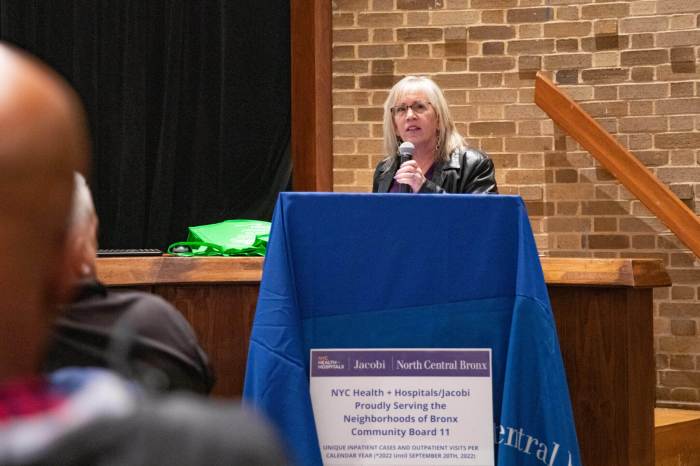AIDS groups concerned that government bodies will now oversee prevention material
The federal Centers for Disease Control and Prevention (CDC) has proposed new rules governing the content of HIV prevention materials that AIDS advocates are charging will favor ideology over effective HIV prevention efforts.
The proposed guidelines, published in the June 16 Federal Register, would require AIDS groups to pre-clear all their CDC-funded HIV prevention materials with a review panel to be created by their state or local health department. Previously, AIDS groups created their own review panels that included a representative from their state or local health department.
The new panels will certify that any materials that address sexually transmitted diseases “shall contain medically accurate information regarding the effectiveness or lack of effectiveness of condoms in preventing the sexually transmitted disease the materials are designed to address.”
This is a new requirement.
The panels will also apply CDC requirements that date to 1992, the last time the health agency updated the guidelines. The 1992 provisions require that materials include “information about the harmful effects of promiscuous sexual activity and intravenous substance abuse, and the benefits of abstaining from such activities” and do not include any material that is obscene as defined under federal law.
Federal standards on obscenity evaluate whether “the average person, applying contemporary community standards,” would see the material as appealing to the “prurient interest,” and whether sex is depicted in a “patently offensive way,” lacking in “serious literary, artistic, political, or scientific value.”
In the proposal, the CDC kept a 1992 requirement that no funds be used to “promote or encourage, directly, homosexual or heterosexual sexual activity or intravenous substance abuse” which the new panels will have to consider.
While AIDS groups have dealt effectively with most of these requirements for more than a decade, a major concern is that the new panels, established by government authorities, might include people who are hostile to HIV prevention efforts. Those panels could make it impossible for AIDS groups to use effective prevention materials.
“I think that’s a very real possibility,” Johnson said. “These guidelines make an institutional process by which right-wing, moralistic values can be enshrined in HIV materials independent of the scientific effectiveness and proven public health rationale.”
Dr. Ed Thompson, chief of public health improvement at the CDC, said the review panels must be “representative of the community as a whole” and they would answer to the community.
“That protection is right there at the local level,” Thompson said. “These are locally accountable panels and they answer to the local electorate.”
While that accountability does not give absolute protection to AIDS groups, it does move the panels towards being “balance and fair,” according to Thompson.
“Nothing solves the problem completely,” he said. “There is no way we can insure that every community will do this in the best way possible.”
Johnson faulted the guidelines for an emphasis on “moral issues” and not promoting HIV prevention practices that are based on science.
“The guidelines are silent on that and that is the most fundamental issue that these guidelines should be addressing,” Johnson said.
Thompson said that much of the objectionable language was “Congressionally mandated” and that the guidelines were created to respond to that mandate, not scientific demands.
“These guidelines are not guidelines on how to craft effective programs,” he said. “These guidelines are not aimed at that. They have a different purpose.”
In light of the new panels, advocates also objected to requirements, both old and new, that they said were vague and did not help them in determining what kinds of materials would be acceptable.
“It’s so broad that every person doing HIV prevention will have to guess whether or not what they are doing accurately or inaccurately describes condoms,” said Dennis deLeon, president of the Latino Commission on AIDS. “The requirement that we send out messages against promiscuous sex—what is promiscuous sex? It’s a lack of certainty.”
Hayley Gorenberg, director of the AIDS Project at Lambda Legal, called the language “loaded and unclear” and said it could create problems.
If an HIV prevention program, for instance, told a participant that reducing the number of his sexual partners from two a day to one a day would be beneficial, would they be promoting promiscuity?
“I certainly think that there is a place in valid harm reduction work and prevention work to talk about whether reducing partners will assist in prevention,” Gorenberg said. “People are very worried about their programs being attacked and they are worried about whether they will be able to say what they need to say to help people.”
Thompson said AIDS groups would have to turn to Congress, the “originators of the language,” to find those definitions as well as to the local community standards.
“The review panels have to base their own understanding of the terms based on local standards,” he said. “We recognize these decisions have to be made in the communities where they are felt.”
AIDS groups have battled with social conservatives over the content of HIV prevention programs almost since the start of the epidemic and the Congressionally mandated language results from those battles. That fight has been particularly intense since the Republican Party took control of the White House and Congress.
A minor proposal in the guidelines requires review panels to ensure that the “title of materials developed and submitted for review reflects the content of the activity or program.”
This is an apparent reference to a 2001 dust up over workshops offered by San Francisco’s Stop AIDS Project that had titles, including “Booty Call,” that enraged some Capitol Hill conservatives.
“I can see shadows of political battles that have been going on in the recent past and that concerns me,” Gorenberg said. “We need to fight to make sure that what we end up with in HIV prevention tracks science and not a political agenda.”
The CDC is taking public comment on the proposed guidelines through August 16 and expects to issue the final guidelines within 120 days after that.


































